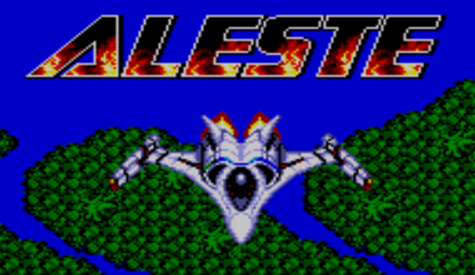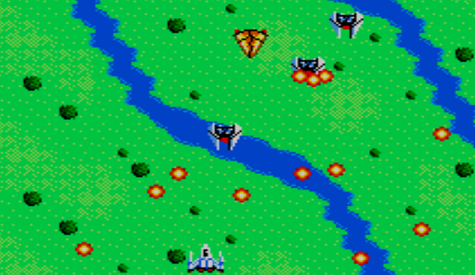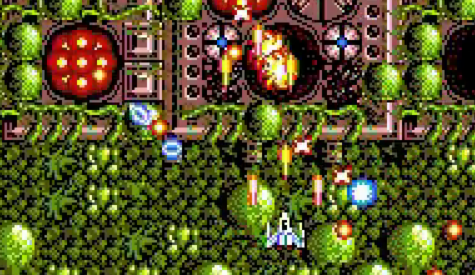Before M.U.S.H.A. came to the west and received its period-centric new name, it was simply known as “Musha Aleste”. The word “Musha” is a traditional Japanese honorific for a bad-ass flying military-grade super robot, according to some experts. The “Aleste” denoted it as part of Compile’s series of shooters by that name. While M.U.S.H.A. is undoubtedly the series most well known entry outside of Japan, it certainly is not the only one to make it to European and American shores. That honor went to the very first Aleste, re-named “Power Strike”. A different name such as “Insanely Hard Flying Plane Time” would have been more appropriate.
Aleste is insanely hard. It makes the Master System hardware perform feats I did not know it could. The screen is populated by (what feels like) hundreds of sprites at a time and although this causes significant slow down, you come to depend on it if only to figure out where to move your little ship next.
The gameplay is simple and if you have played M.U.S.H.A. or any of Hudson’s SOLDIER series, you have it figured out already. For the rest of you, Aleste requires you to pick up special weapons to give yourself a fighting chance against the hordes of bullets and enemies that come racing towards your fragile little plane. Surprisingly, although this is an 8-bit game, there are more power ups than almost any other shmup I have ever played, eight in total. These range from blue shields that spin around your ship, eating bullets before they hit you, to wave beams that clear the field ahead of you and give you time to breathe. The special weapons are insanely overpowered, devouring bullets and enemies with ease. They are also limited, however, and if you find yourself suddenly without a super weapon, life becomes very hard and very short.
While hard as hell, there is something about Aleste (like M.U.S.H.A.) that is insanely fun. Although you can never relax, there is a certain logic to the way enemies fly at you or shoot at you and most deaths feel epic rather than cheap or unfair. Aleste is a game where you will see improvement in yourself in every play through as the nuances and patterns become clear.
The graphics, while repetitive, bear that trademark Master System brightness. Aleste is a game that is easy on the eyes and the sprites for both your ship and all the different enemies are very well drawn. Unfortunately, the audio also bears the Master System trademark. The sound effects are high pitched and grating, wearing on a player almost as much as the extreme difficulty. The music bears no resemblance to the energetic, epic tunes that M.U.S.H.A. is known for. Yeah, the Master System was never known for outstanding audio but given that this game was released two years after Fantasy Zone, I do not think it is incorrect to expect the audio to be at least tolerable.
A less tangible gripe about the game is the amount of material that was removed when Aleste was ported from the MSX to the Master System. There is actually a fairly interesting story about an evil computer system attacking humans and a pilot who decided to avenge his sister by blowing stuff up. None of that material made it into the Master System version of the game. It is hard for me to complain too loudly about this since I have even seen an MSX much less played Aleste on it, though.
If you are wondering to yourself where you were when Aleste came to town, the answer lies in the horrible marketing strategies game company’s used in the late-80’s. While Aleste (under the name Power Strike) made it into retail in Europe in small numbers, it was only offered for sale in America through a mail-only offer. As a result, NTSC-U copies of Aleste in the wild are pretty rare and if you see one for a decent price, you really should pick it up.
If you are at all a fan of things related to Sega and / or Shmups, you really should try Aleste. Odds are that you will not fall in love with it. I am a total retro-head and even I can only play the game for a few minutes before I remember that I can also play M.U.S.H.A. Still, Aleste is a testament to amount of horse power the underrated Master System had. Aside from the music, all of the elements that make M.U.S.H.A. and other later Aleste games great are all present here in the original and it is surprising how it only took Compile gaining experience and applying a little polish to make this game into a great series of SHMUPS.
Letter Grade: C+





Nice review, didn’t expect to see it here. Had no idea the MSX version had a big story, that’s interesting to hear. I like the game, and its sequel, on the SMS. The SMS had a lot of great shmups though between Fantasy Zone 1 & 2, Astro Warrior, Scramble Spirits, Bomber Raid and my favorite, Thunder Blade (kind of a hybrid between Space Harrier and Power Strike, and a great arcade port given the SMS’s limitations). Haley Wars on the Game Gear is also a really underrated shooter and one of the few GG exclusives that’s actually worth its salt.
I might have to try Haley Wars out. I honestly did not know that there were any decent shooters exclusive to the GG. I figured they were all Master System ports.
I’ve always wanted to give Halley Wars a try. I believe it was a port of a Famicon Disk System game but I’m not sure how similar the two versions are. It sounds like the game has some unique gameplay with the way enemies and comets you miss affect the Earth’s damage meter.